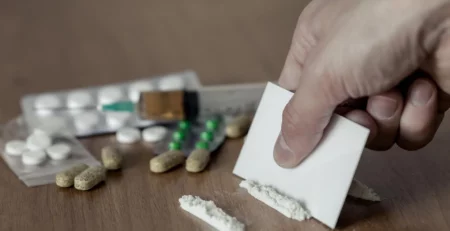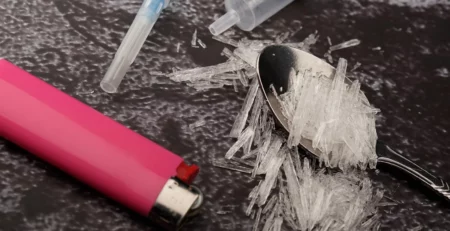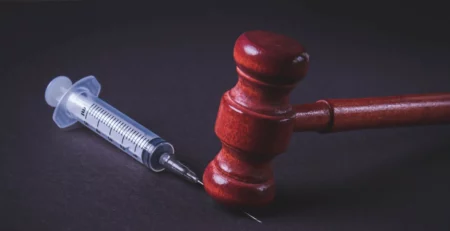Meth and Depression
Get Dual Diagnosis Treatment at Icarus in Nevada
As a part of our team of behavioral health professionals at Icarus Behavioral Health Nevada, I have seen firsthand the destruction that addiction can cause to individuals and families.
Across the US and in Nevada as well, meth use has been on the rise lately and its connection to depression is a growing problem.
In this post, we will explore the complicated relationship between meth and depression and how they feed into each other. We will also look at how our licensed treatment programs for mental health and addiction treatment work at Icarus Nevada, and how they offer support for lasting recovery.
An Overview of Meth and Mood Disorders

Methamphetamine is a Schedule II controlled substance meaning it has a high potential for abuse and can cause severe physical and psychological dependence. Individuals who have developed a tolerance to methamphetamine may change their method of administration, or ‘preferred route’, to achieve a more immediate response.
Those who have become dependent on methamphetamine may change their method of use to smoking or injecting to get their high and avoid the comedown.
Depression is a treatable condition and getting professional help is the first step to recovery.
Icarus Behavioral Health Nevada has various treatment programs including inpatient and outpatient to fit each individual’s needs.
Get Effective Meth Detox and Rehab Options – Reach Out Now!
Meth Use is on the Rise in Nevada and Nationwide
Meth is a highly addictive and powerful stimulant that’s been on the rise lately. Meth use gives you temporary energizing effects and increased alertness but long-term damage to your mental health.
According to the National Institute on Drug Abuse (NIDA) meth use has increased 61% among adults 26 and older between 2015 and 2019. This increase in use has led to an increase in meth-related ER visits, overdoses and deaths.
In Nevada meth-related overdose deaths have increased by 30% in 2 years from 2020 to 2022. Meth use is especially concerning because of its high potential for abuse and addiction.
Meth and Depression: Breaking the Cycle of Doom and Gloom

Depression is a common comorbidity (dual diagnosis) among people with meth addiction. Research shows that up to 50% of people with a substance use disorder (SUD) also have depression. Meth addiction can lead to both physical and psychological damage, emphasizing mental health concerns.
Meth use feeds into depression and vice versa. The relationship between meth and depression is complicated and cyclical and hard to break without treatment. Meth abuse causes significant brain changes specifically with dopamine production and receptor shutdown.
These changes lead to post-meth abuse depression and other post-acute withdrawal syndrome symptoms. People with pre-existing depression may turn to meth as a way to self-medicate and get short-term relief but end up with long-term damage to the brain’s dopamine production.
And withdrawal symptoms from meth use can trigger depression making it even harder to seek help. Professional treatment is key to addressing meth withdrawal and reducing relapse. Severe depression during meth withdrawal indicates the need for professional treatment.
Get Accredited Treatment Programs at Icarus – Reach Out Now!
The Destruction of Meth and Meth Withdrawal on Mental Health
Meth use can have long-term changes to brain chemistry and function. Chronic meth use can damage brain regions responsible for mood regulation and increase the risk of depression, anxiety and other mental health issues such as meth psychosis. Chronic use of meth at high doses can cause more severe withdrawal symptoms including drug craving after a period of binging.
And meth use can lead to social isolation which can worsen depression. The physical and emotional toll of meth use is devastating so seek help.
At Icarus Behavioral Health Nevada we have treatment programs that address the complexities of meth addiction and depression. Our team will work with you to create a personalized treatment plan so you get the support and care you need to achieve long term recovery.
Our Treatment Approaches at Icarus Behavioral Health Nevada

There is hope for those struggling with meth addiction and depression. At Icarus Behavioral Health Nevada we offer licensed mental health treatment programs with or without substance abuse and dual diagnosis treatment programs.
Our comprehensive approach addresses meth addiction and depression at the same time for long-term recovery.
Behavioral Therapies for Meth and Mental Health Concerns
Cognitive-behavioral therapy (CBT) and contingency management (CM) can help you identify and change negative thought patterns and behaviors associated with meth use and depression. A significant decrease in suicidal thoughts and other depressive symptoms is often seen when meth use is reduced compared to other drugs.
Our experienced therapists will work with you to develop coping skills and strategies to manage cravings and triggers.
Medications to Curb Cravings and Improve Mood
Antidepressants such as selective serotonin reuptake inhibitors (SSRIs) can help manage depressive symptoms. In some cases, bupropion (Wellbutrin) may be prescribed to aid in meth addiction treatment.
Professional medical detox and treatment are key to addressing meth withdrawal symptoms and preventing relapse. Our medical team will work with you to determine the right medication for you.
Support Groups for Substance Abuse Recovery
Join a support group such as Narcotics Anonymous (NA), Crystal Meth Anonymous, and SMART Recovery to get a sense of community and accountability for long term recovery.
Our support groups provide a safe and supportive environment to share your experience and get guidance from others who have gone through similar struggles.
Holistic Approaches for Dual Diagnosis Clients
Our dual diagnosis treatment programs also include holistic approaches such as mindfulness and meditation to help you develop healthy coping skills and overall wellness.
These alternative therapies can reduce stress and anxiety and promote a healthier and balanced life.
Paying for Meth and Depression Treatment with Insurance

At Icarus Behavioral Health Nevada we know treatment can be expensive. That’s why we accept many forms of private insurance companies, and we will work with you to find out what’s covered and get you the most benefits possible.
We accept the following providers:
Note: This is not a complete list, please call to get exact details on your coverage and costs to attend treatment (if any apply).
Up To 100% of Rehab Costs Covered By Insurance – Call Now!
Get Help for Meth and Depression Now at Icarus Nevada
Meth and depression are linked issues that need a comprehensive treatment approach. If you or a loved one is struggling with meth addiction and depression don’t wait to get help.
In my years of practice, I have seen many clients overcome both conditions and achieve lives that would have been improbable if not impossible without support.
If you or a loved one are facing mental health issues amid meth abuse, please call Icarus Behavioral Health Nevada today to learn more about our programs.
It is within your reach: get started on the path to a healthier happier life today. All calls are confidential, so please reach out for proven, evidence based support with us at Icarus in Las Vegas now!











